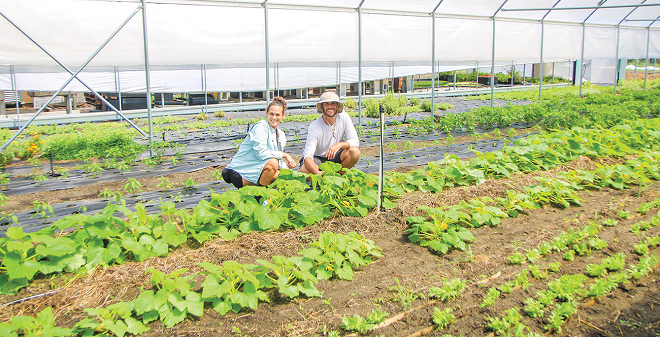

Aug 18, 2023High tunnels help Sugar Top Farm fight insects, heat
Sugar Top Farms employs high tunnels to battle insects and winds. The tunnels help the central Florida area farm grow leafy greens on the highest point on the Florida peninsula.
After discovering a lack of local produce in the greater Orlando, Florida, area, Jordan and Jessica Cooper left corporate careers to grow salad greens and other vegetables at 312 feet above sea level on Sugarloaf Mountain, a hill in Clermont.
With fruit being more available, the Coopers wanted to create a center where shoppers could purchase local vegetables, which previously required driving nearly two hours to Gainesville.
Sugar Top started with lettuce and though it attempted to grow many greens for restaurant and farm market customers, the Coopers decided to focus on salad greens because few other growers had them, Jordan Cooper said. Baby arugula is the company’s specialty, and Cooper prefers growing lightweight and high-value leafy greens, leaving the others to larger farms.
At different times from the fall to spring, the Coopers grow a variety of vegetables and microgreens, including turnips, radish, kale, collards, bok choy, broccoli, cauliflower, cucumbers, eggplant, tomatoes, onions, squash and edible flowers. The farm is increasing production on its 2.5 acres.
For Sugar Top, which began dabbling in tunnels in 2016 and expanded growing in them in 2021, tunnels protect crops from central Florida’s oppressive heat, which can limit production and quality.
“Heat is always something,” Cooper said.
Spring’s heat and high winds mix with sandy land, drying the soil, which is highly hydrophobic, repelling or dissolving water.
“It’s always a battle,” he said.
Tunnel differences
Because plants require extra light, the Coopers were surprised to discover some of its lettuce grew better during the winter in open fields.
“Tunnels are not always a catch-all,” Cooper said. “We are always learning from it and how the tunnels and light affect certain things, what crops do better in them than others. We like to learn about all of the things of a new system and figure out what’s best for our specific microclimate.”
On the hill, consistent sea breezes and wind circulation give the Coopers advantages over lower elevations. At the same time, however, the limited clay soil dries quickly.
“Being in the Florida desert, we dry out so easily with the wind,” Cooper said.
When hurricanes strike, the sandy soil is also a disadvantage, and offers little protection in high winds.
Growing in a subtropical environment, insects remain a constant threat. Unlike northern regions’ long dormant winters that can kill pests, insects in Florida may leave for a month but harbor in the soil and emerge in warmer weather.
“Once warm, it’s feast or famine for them,” Cooper said. “If we don’t control them, they will wreak havoc. We don’t really have any off-season for pests.”
Major insect pests include Japanese beetles and caterpillars. Cooper saw a major influx of the beetles, which affect the brassica family of leafy greens. The high tunnels help counter leafhoppers, which feed more in the tunnels’ shade.
Unlike other farms, the Coopers eschew insect netting and other exclusion methods. Because crops grow quicker in central Florida than other regions, the Coopers must limit how they focus their time. For improved efficiencies, Sugar Top adds and removes covers. Biological pest control as well as organic sprays aid in prevention.
Preserving soil
“Soil health is everything,” Jordan Cooper said. “We are really at the mercy of our soils. It’s something we think seriously about. We’re always reading different literature and finding out how important it is and how certain crops might be like as far as mineralization. Every year we try to improve our soils.”
To ease land constraints, Cooper is talking with his neighbors about purchasing or using some of their land to expand production of carrots, which have long maturity dates.
Cooper advises new growers to start small and grow attainable crops. Growers shouldn’t cultivate 10 acres if they can’t find an outlet for the production. Instead, to gain a customer base, whether restaurants or farmers markets, start with something like four acres, do well with it and grow from there.
“You don’t want to expand too much,” Cooper said. “This compares to the American model where you do as much as you can. But it’s important to start small and master that versus doing everything at once.
“Specialize in certain crops to give your name something recognizable, a specialty. Focus on a couple of things and do those really well, growing from there.”
Sugar Top began when the Coopers relocated from Fort Lauderdale after the workers comp and insurance company that Jessica worked for transferred employees to the Orlando area. Jordan was in management for a major retail store. The couple fell in love with the region and found land at the time more affordable than in south Florida.
The joy of farming for the Coopers is doing something for society versus focusing on making money.
“It boils down to simple living and helping society, which is easy to forget,” Jordan Cooper said. “One thing that was missing from my life before farming was how if what I did was making a difference in the world and helping society in a greater way. So many jobs don’t do that.
It’s the purpose of it (farming) and what you’re bringing to the table and how you’re helping your local community,” he said. “It’s improving our society and the local economy.”
— Doug Ohlemeier, assistant editor
Top photo: Sugar Top Farms’ Jessica and Jordan Cooper grow salad and leafy greens on Sugarloaf Mountain, a hill 312 feet above sea level in the Orlando, Florida, area. Photos by Doug Ohlemeier.














